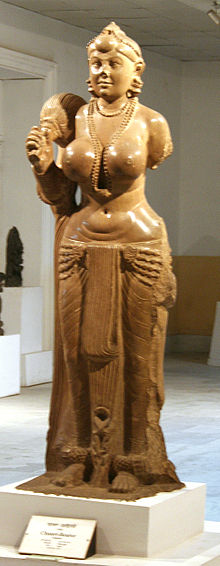Yaksha


Yaksha ( Sanskrit यक्ष yakṣa ; Pali : Yakkha) is the name of a broad class of nature spirits or gods of lower rank (Sanskrit upa-devas or devas ) in Hinduism and Buddhism . The feminine form of these beings is called Yakshi ( Yakṣī / Yakkhī) or Yakshini ( Yakṣiṇī / Yakkhinī). They are considered guardians of treasures hidden in the earth and are therefore counted among the appendages of Kubera , the god of wealth. Yakshi is also the name of Mrs. Kuberas.
Manifestations
Indian mythology
According to Hindu and Buddhist mythology, there are different forms of yakshas. On the one hand, a yaksha is a being that is specifically associated with trees and mountains. On the other hand, yakshas also refer to demonic figures that live in the wild (typically in free-standing trees on deserted plains) and can cause problems for travelers.
Yakshas are often depicted with fat bellies, yahshinis as seductive women with ample breasts. This is a sign of the high amount of Qi or Prana that they have within. Well-known and often shown representative is the god of wealth Ganesha . This huge storage of Qi or Prana makes them so powerful and gives them control over everything that is associated with abundance and multiplication (fertility of fields or animals, increase of wealth etc.).
The Apsaras , Gandharvas and Vidyadharas have a comparable rank in the divine heaven . The South Indian dance theater Yakshagana takes its name from yaksha and gana (“song”) .
The Indian epic Mahabharata speaks of Vaiśravana ( Pali canon : Vessavaṇa ), who changes from a dark being in Kumbhīra and is venerated as a protector.
A female tree spirit belonging to the Yakshinis is the Salabhanjika , who is depicted as the bender of the Sal tree.
Thai mythology
In Thai mythology, yakshas ( Thai ยักข์ also ยักษ์ , spoken: [ ják ], often translated as giant ) are of great importance. They are mentioned as early as the 14th century in the first great work of Thai literature, the Traibhumikatha (in Thai: ไตรภูมิ กถา , sermon on the three worlds , later known as Traiphum Phra Ruang ): They serve the god Indra in Indra's heaven , which is Located on the top of Mount Meru in The World of Sensuality (Kamaphum) above the region of the people in the region of Devata . Here they are referred to as the 28 Yaksha kings who advise God in war armor. Another army of yaks also guard the precious stone palaces of the Devatas .
Yakshas are also common in Thai art. The best known is certainly the Ramakian , the ancient Indian epic about the struggle of the good (Prince Rama) against the bad (the yakshas who live under King Thotsakan, the "ten-headed" on the island of Lanka). Episodes from the Ramakian regularly in Khon -Maskentanz on the stages of the country and rarely in the shadow Nang Yai listed; they are immortalized on wall paintings (for example in Wat Phra Kaeo in Bangkok ) and reliefs (152-part relief along the surrounding wall of the Ubosot in Wat Pho , Bangkok). Life-size yakshas guard the entrances to important temples ( wat ) in the country in pairs .
One of 12 yaks, guardians at Wat Phra Kaeo , Bangkok
Thotsakan and followers: Wat Pho , Bangkok
Indonesia
In the Indonesian shadow play wayang kulit , the Hindu tradition has been preserved under Islamic influence. The central character, the Gunungan set up for the opening , shows a portal in the lower area, which is guarded by two yakshas, who here embody the terrifying demons of the underworld.
China, Japan, Myanmar, Tibet
In other Buddhist countries, yakshas are also called Chinese 夜叉 , Pinyin yèchā , Jyutping 6 caa 1 each ; Japanese 夜叉 , kana や し ゃ , Romaji yasha ; Burmese ba-lu and Tibetan གནོད་ སྦྱིན་ Wylie gnod sbyin . In the Buddhist mythology of Japan, Yaksha is also referred to as a companion of Bishamon , the guardian of the northern quadrant, a good deity who protects the righteous. The name can also refer to the twelve Heavenly Generals who protect the Medicine Buddha .
literature
- Anna Dallapiccola: Dictionary of Hindu Lore and Legend . Thames & Hudson, New York 2002, ISBN 0-500-51088-1
- Frank E. Reynolds (translator): Three worlds According To King Ruang . ( Berkeley Buddhist Studies Series 4 ) Berkeley 1982, ISBN 0-89581-153-7 (Thai mythology)



